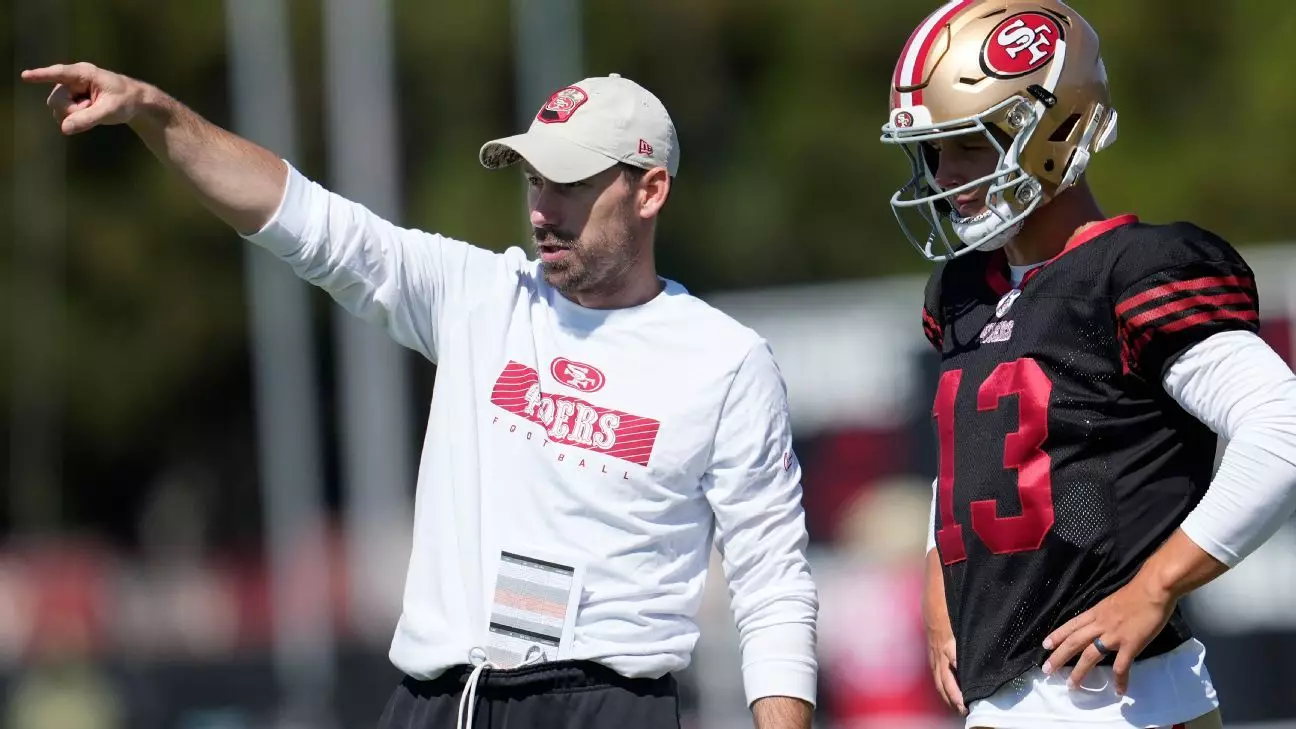The San Francisco 49ers, one of the iconic franchises in the NFL, are entering a pivotal phase following a disappointing season in 2024. Coach Kyle Shanahan has announced significant modifications to his coaching staff, reflecting a commitment to revitalizing the team’s performance. The changes illustrate not just a reaction to past struggles but also a strategic vision for the upcoming season, aiming to build a more cohesive and effective squad.
After years of dedicated service within the organization, Klay Kubiak has ascended to the position of offensive coordinator – a promotion long anticipated by fans and analysts alike. Kubiak’s pathway within the 49ers has been marked by steady progress, having initially served in roles that include offensive passing game specialist and assistant quarterbacks coach. His recent tenure as the offensive playcaller during the preseason and crucial games has proven his capability and readiness for the official title. Coach Shanahan has lauded Kubiak’s contributions, highlighting his vital role in shaping offensive strategies over the past two seasons.
Despite Kubiak’s new title, Shanahan will retain his role as the offensive playcaller, which raises questions about the dynamic between the two. Some may argue that this dual hierarchy could complicate the implementation of a unified offensive vision. However, the decision to promote Kubiak indicates Shanahan’s trust in his abilities and suggests a collaborative approach moving forward, where Kubiak can contribute more significantly without taking full control.
The adjustment in the quarterback coaching department adds another layer to the offensive restructuring. Brian Griese, who played a pivotal role in developing quarterback Brock Purdy, has opted to step back from coaching. This shift opens the door for Mick Lombardi, who has experience as a senior offensive assistant, to step into the role. Transitioning coaches often comes with its challenges, but this change could also breathe new life into the team’s approach to quarterback development.
On the defensive side of the ball, the 49ers have made notable hires that combine veteran experience with fresh talent. The appointment of Gus Bradley as the assistant head coach of defense stands out; Bradley brings over a decade of expertise from various teams, including the Indianapolis Colts and Seattle Seahawks. His experience as a defensive coordinator is expected to bolster what has been a formidable defensive unit, introducing innovative strategies and reinforcing player development.
In a less traditional move, the addition of Jake Lynch, the son of General Manager John Lynch, as a defensive quality control coach fosters a familial connection to the team’s operations. While such choices could raise eyebrows regarding favoritism, they also emphasize a sense of continuity and trust within the organization, potentially leading to a stronger team culture.
The Niners also continue to build their defensive staff with additional hires such as Ray Brown for defensive backs and Colt Anderson for special teams. These strategic moves aim not only to enhance specialization in each area but also to ensure that players receive focused coaching tailored to their positions, which could lead to improved performance on the field.
The 49ers’ approach to staff changes highlights a broader commitment to development and strategic coaching synergy. Coach Shanahan’s decision to elevate Kubiak while still maintaining the play-calling responsibilities indicates a forward-thinking mentality rooted in collaboration. Moreover, the diversity of coaching backgrounds on the staff—combining youth with seasoned professionals—suggests a carefully crafted strategy aiming to harness the best of both worlds.
The extensive list of coaching changes, totaling 14, reflects a culture of adaptability within the organization. The willingness to re-evaluate roles and bring in new talent is essential in the NFL, where success often hinges on the ability to innovate and respond to challenges swiftly. As 49ers fans look ahead to the 2025 season, there is a palpable sense of excitement about the potential trajectory of the franchise under this renewed coaching structure.
In closing, the San Francisco 49ers are not merely changing coaches but are actively reshaping their identity for future competitiveness. With a blend of promotion, experience, and youth, the franchise appears to be on a promising path towards reclaiming its status among the league’s elite. The coming season will be critical as these strategies are put to the test, and players adapt to the fresh dynamics of their coaching staff.


Leave a Reply